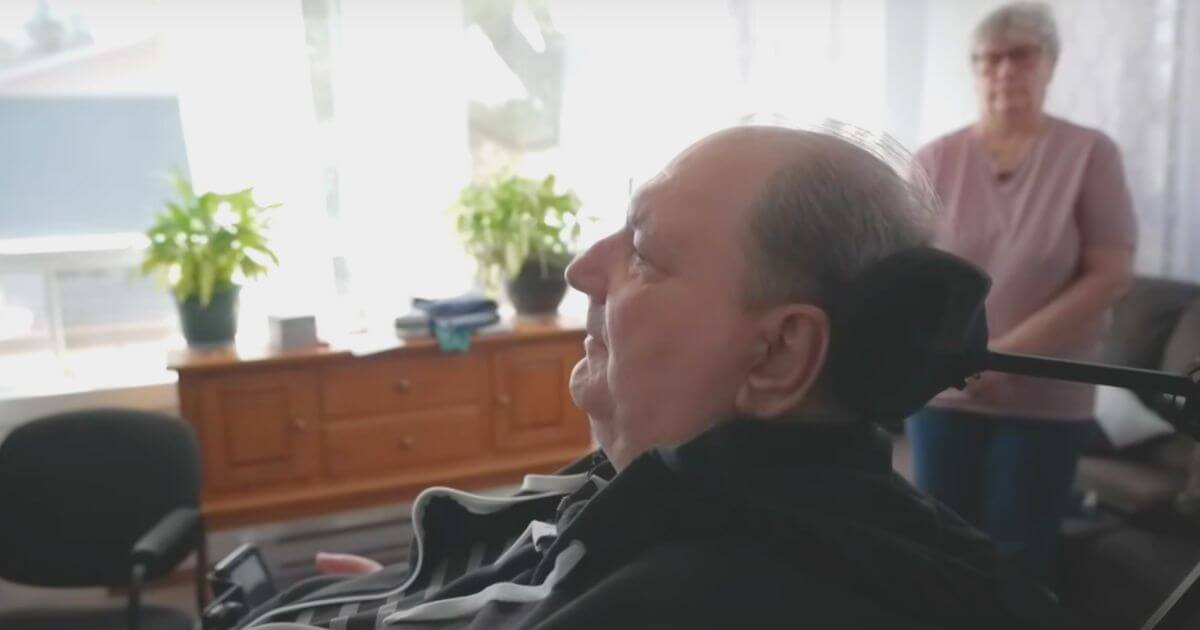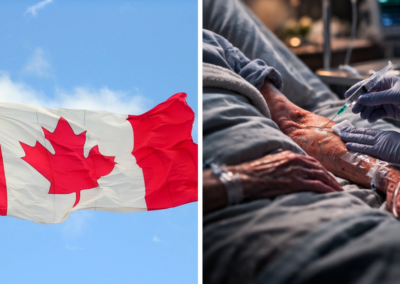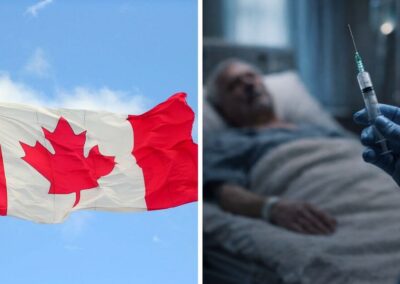A woman in Canada has described the death of her husband, who died by euthanasia after developing severe pressure sores, as a “horror” as a public inquiry begins.
A coroner’s public inquiry has begun into the death of Normand Meunier, 66, who was quadriplegic and left on a stretcher in the Saint-Jérôme Hospital emergency room in Quebec in January of last year. He developed serious bedsores on his buttocks that left muscle and bone exposed because he did not have access to a special mattress, which would distribute weight evenly throughout his body. He subsequently opted to have his life ended by euthanasia under Canada’s ‘Medical Assistance in Dying’ programme.
The day before his death in March last year, Meunier told Radio Canada “I don’t want to be a burden. At any rate, the medical opinions say I won’t be a burden for long; as the old folks say, it’s better to kick the can”.
Meunier’s widow, Sylvie Brosseau, told reporters that “His last two weeks…it was horror”. She said “It was horrible. He had no buttocks. There was nothing left”. She described the system as “totally negligent”.
Brosseau highlighted a lack of communication between different parts of the healthcare system as a major factor in the failures of proper care that led to her husband’s decision to request an assisted suicide.
Meunier was told that the sore – a gaping hole a few centimetres in diameter – would take several months to heal. The day before his death, he told Radio Canada that he preferred to end his physical and psychological suffering by opting for state euthanasia.
An avoidable death
The inquiry was demanded by Moëlle Épinière et Motricité Québec, an advocacy group for people with spinal cord injuries.
The group’s President, Walter Zelaya, told reporters that “There are deaths that happen that shouldn’t happen, because we have everything we need to treat these people”.
He added “We have the expertise, but often we lack the coordination. There’s negligence that happens”.
Zelaya also stated that bedsores are often not considered important, even by some healthcare professionals. “There’s a misunderstanding among key personnel. It’s important they understand a pressure sore can lead to death if it’s not treated properly”.
Normand Meunier’s final trip to the hospital was not the first time that he had struggled to access adequate care. After becoming quadriplegic in 2022, hospital visits became a regular occurrence.
In the months prior to his death in 2024, he had been hospitalised numerous times with infections.
“Each time, we had to ask for the special mattress which never arrived. It was a constant battle,” Munier’s wife said. “At the end, the head of the ER threatened to ban me from entering the hospital”.
‘An alternative to decent care’
Disability advocates in Canada have warned that Normand Meunier’s death highlights the reality of Medical Assistance in Dying (MAiD) providing an excuse for the inadequate provision of medical care.
“It is becoming an alternative to decent care, and the numbers will explode” said Steven Laperrière, general manager of Regroupement des Activistes Pour L’Inclusion au Québec (RAPLIQ), a group that offers support and advocacy in defending the rights of disabled people.
Laperrière expressed his shock at the story. “It’s really a case of disbelief… What are we doing in order to help disabled persons or sick people to live in dignity prior to dying in dignity?”.
“It’s pretty basic… Nobody will convince me that within a few hours the proper mattress could not have been found,” said Laperrière.
“To me, that’s totally a lack of professionalism”. He added that Meunier “would probably still be alive today” if staff had “been really professional about it”.
A repeated pattern in Canada
Normand Meunier’s death is not the first high-profile instance of MAiD in Canada linked to inadequate care.
Jean Truchon, who had cerebral palsy, was one of the key figures in campaigning to expand the scope of euthanasia and assisted suicide legislation in Canada in 2019 so that the law would not only apply to people whose death was ‘reasonably foreseeable’. Following his successful legal challenge in Quebec, in 2021, the Canadian Parliament ultimately repealed the requirement that the natural death of those applying for euthanasia or assisted suicide be “reasonably foreseeable”.
After Truchon’s life was ended by euthanasia in 2020 aged 51, he was praised for his contribution to the assisted suicide debate by François Legault, the Premier of Quebec, and then-Health Minister Danielle McCann.
However, in an email seen by The Telegraph from 2016, Truchon suggested he may not have wished to die at all if he had been able to access better care.
“In response to your question regarding home care, I think that indeed if there were services for 70 hours or more, I would have preferred to stay at home and possibly I would not have had the same desire to die”, he said in a letter transcribed by his psychologist.
Warnings for UK from Canada
With the Terminally Ill Adults (End of Life) Bill having narrowly passed Third Reading in the House of Commons last month and a Second Reading expected in the House of Lords this September, the case of Normand Meunier adds weight to concerns from the Bill’s opponents. Many argue that, if legalised, assisted suicide will become an alternative to decent care in the UK’s already overburdened healthcare system.
Earlier this year, Gregory Stafford MP, a member of the Health and Social Care Select Committee and a former NHS Director, warned that “Across the country, [palliative and end-of-life] care is patchy, our ageing population continues to strain adult social care services, and the NHS remains under immense pressure. In that context, the legalisation of assisted dying risks creating a quiet, insidious pressure on patients who feel they are a burden, and on families and institutions conscious of stretched resources”.
Spokesperson for Right To Life UK, Catherine Robinson, said “The tragic case of Normand Meunier serves to highlight the inevitable, detrimental effect that the option of assisted suicide has on both patients and health services as a whole”.
“In instances where inadequate healthcare is causing further suffering, the response should never be to offer death”.












